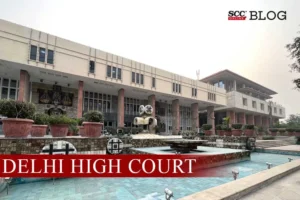Delhi High Court: The present application under Section 439 read with Section 482 of the Criminal Procedure Code, 1973 (‘CrPC’), read with Section 31 of the Protection of Children from Sexual Offences Act, 2012 (‘POCSO Act’), was filed on petitioner’s behalf, seeking grant of regular bail in the case arising out of FIR registered under Sections 384, 506, 201, and 341 of the Penal Code, 1860 (‘IPC’), presently pending in Court of Additional Sessions Judge (SC-POCSO), South Saket Court, New Delhi. Swarana Kanta Sharma, J.*, opined that the allegation that petitioner had misrepresented to the victim that he was making her speak to a High Court Judge, and that he was working with a High Court Judge, who would ensure that compensation was granted in a pending case before a District Court when the nude videos would be sent to the Judge, were in themselves grave and serious allegations, which undoubtedly brings disrepute to the judicial system. Thus, the Court dismissed the bail application.
Background It was alleged that petitioner assured the victim and her mother that he was a munshi of a High Court Judge and he would help them to get maximum punishment to the accused in their other criminal case pending in the District Court, Saket if nude videos of the victim who was aged about 17 years would be showed to the judge. Thereafter, when the victim’s mother had gone for work, petitioner called the victim and asked her to prepare her nude videos and send them to him. Later on, the victim’s mother requested petitioner to delete the videos, however, petitioner denied to do the same and threatened that he would upload all the videos on social media if Rs. 25,000 were not paid to him.
A complaint regarding this was filed at Police Station Saket, based on which the present FIR was registered. During investigation, the mobile phones were seized, and it was revealed that the mobile phones were formatted to intentionally destroy the evidence.
Analysis, Law, and Decision
The Court opined that the victim’s statement under Section 164 of the CrPC revealed that petitioner had introduced himself as a munshi of a Delhi High Court Judge and that he could get their work done, that is, get them compensation by asking the Judge with whom he was attached. Further, petitioner asked for the victim’s nude videos on the pretext of showing them to Judge Sahab. Later, petitioner started to blackmail them and also sent those videos to the victim’s family members.
The Court considered the Forensic Science Laboratory, Delhi (‘FSL’) findings and observed that though the mobile phone which was used for the commission of offence had been formatted, the phone had been sent for cyber forensic analysis and thus the obscene images and videos were retrieved from the phones, which revealed the prima facie truth of victim’s statement. The Court opined that it was unlikely that the victim’s mother would herself prepare the nude photographs of her daughter.
The Court opined that the allegation that petitioner had misrepresented to the victim that he was making her speak to a High Court Judge, and that he was working with a High Court Judge, who would ensure that compensation was granted in a pending case before a District Court when the videos would be sent to the Judge, were in themselves grave and serious allegations, which undoubtedly bring the judicial system into disrepute. It also reflected how unassuming or illiterate persons were allured in the name of the Judges for blackmailing and for commission of offences.
The Court further noted that in absence of registration of this case and investigation “petitioner would have succeeded in giving an impression that judicial system was indulged in such abhorring acts”. The Court further opined that using the name of judge or judicial officer by unscrupulous persons brings disrepute to the judicial system which could not be allowed. The Court opined that the present case and order would serve as a reminder that general public should not believe unscrupulous persons and give them money, even if they were assured that they would get some work done from within the judicial system by such payment. Such persons and such acts were a threat to the judicial system which shakes the faith of the community in the judicial system. The justice delivery system had to be stubbornly safeguarded from such acts and persons.
The present bail application was dismissed considering the fact and circumstances of the case and that there was no ground for grant of bail as charges were not framed till date.
[Harish Chander v. State (NCT of Delhi), 2023 SCC OnLine Del 8261, decided on 06-12-2023]
*Judgment authored by: Justice Swarana Kanta Sharma
Advocates who appeared in this case :
For the Petitioner: Ankit Gupta, Astha Joshi, Akash Gupta and Divya, Advocates
For the Respondent: Manoj Pant, APP for the State

